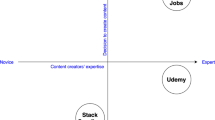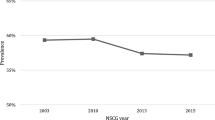Abstract
Due to increasing digitalization in all aspects of life, the demand for qualified software development professionals continues to increase. Students from underrepresented groups, such as first-generation students from non-academic families, minorities, single parents, and women represent an underutilized pool of hitherto untapped potential talent. The question arises as to which unique perspectives STEM graduates from underrepresented groups can bring to their future careers. In addition to programming skills, non-technical competencies, such as foreign language abilities, intercultural communication, creativity, conflict management, team-building, and organizational skills are vital for success in diverse, international project teams. Historical data from a large job market database for new graduates, developed for a consortium of universities in Bavaria, Germany, is analyzed using machine learning tools. Career competencies requested over the last 14 years by recruiting companies are compared to potential advantages offered by STEM graduates from underrepresented groups. Forecasts for the future demand in career competencies are projected based on this historical data.
Access this chapter
Tax calculation will be finalised at checkout
Purchases are for personal use only
Similar content being viewed by others
References
Agnihotri, D., Verma, K. & Tripathi, P. (2014). Pattern and cluster mining on text data. In 2014 fourth international conference on communication systems and network technologies, Bhopal, India (pp. 428–432).
BAM (2011). Bundesanstalt fuer Migration und Fluechtlinge, Bestandsaufnahme und Vernetzung. In Vernetzungsworkshop: Integration von Studierenden mit Migrationshintergrund an deutschen Hochschulen.
Beecham, S., Clear, T., Barr, J., Daniels, M., Oudshoorn, M., & Noll, J. (2017). Preparing tomorrow’s software engineers for work in a global environment. IEEE Software, 1(34), 9–12.
Bell, S. (2010). Project-based learning for the 21st century: Skills for the future. The Clearing House: A Journal of Educational Strategies, Issues and Ideas, 83(2), 39–43.
Branz, L., Pastran Reina, L., Richter, J., Waizmann, B. & Brockmann, P. (2019). Sentiment analysis of male and female developer comments: Exploring gender influence on emotional expressions in software engineering projects. In GE@ICSE19 second workshop on gender equality in software engineering. Montreal, Canada.
Budinska, L. & Mayerova, K. (2017). Graph tasks in Bebras contest—what does it have to do with gender? In CSERC 17 computer science education research conference. Helsinki, Finland.
Cheryan, S., Siy, J., Vichayapai, M., Drury, B., & Kim, S. (2011). Do female and male role models who embody STEM stereotypes hinder women’s anticipated success in STEM? Social Psychological and Personality Science, 2(6), 656–664.
Dangeti, P. (2017). Statistics for machine learning. Birmingham: Packt Publishing.
Faulkner, W. (2009). Doing gender in engineering workplace cultures. Observations from the field. Engineering Studies, 1(1), 3–18.
Goodfellow, I., Bengio, Y., & Courville, A. (2016). Deep learning. Cambridge: MIT Press.
Hecht-Nielsen, R. (1989). Theory of the backpropagation neural network. In Proceedings of the International Joint Conference on Neural Networks (vol. 1, pp. 593–611). IEEE.
Hinze, A., Timpany, C., Bowen, J., Chang, C., Starkey, N., & Elder, H. (2018). Collecting sensitive personal data in a multi-cultural environment. In HCI 2018 Proceedings of the international human computer interaction conference. Las Vegas, Nevada, USA.
Hoda, R., Ali Babar, M., Shastri, Y., & Yaqoob, H. (2016). Socio-cultural challenges in global software engineering education. IEEE Transactions on Education, 3(60), 173–182.
Ifenthaler, D., & Widanapathirana, C. (2014). Development and validation of a learning analytics framework: Two case studies using support vector machines. Tech Know Learn, 19, 221–240.
Ilumoka, A. (2012). Strategies for overcoming barriers to women and minorities in STEM. In IEEE 2nd integrated STEM education conference, Ewing, New Jersey, USA (pp. 1–4).
Kucak, D., Juricic, V. & Dambic, G. (2018). Machine learning in education—a survey of current research trends. In Proceedings of the 29th AAAM international symposium (pp. 406–410).
Liebenberg, J. & Pieterse, V. (2016). Career goals of software development professionals and software development students. In CSERC 16 computer science education research conference (pp. 22–28). Pretoria
Maurer, K. (2019). Kompetenzentwicklung in MINT-Berufen: Ermittlung zukünftig notwendiger Kompetenzen mittels Machine Learning (Master’s thesis). Nuremberg Institute of Technology, Nuremberg.
McNamee, P., & Mayfield, J. (2004). Character N-Gram Tokenization for European language text retrieval. Information Retrieval, 7, 73–97.
Mitchell, T. M. (2010). Machine learning. McGraw-Hill series in computer science. New York, NY: McGraw-Hill.
Mohri, M., Rostamizadeh, A., & Talwalkar, A. (2012). Foundations of machine learning. Adaptive computation and machine learning. Cambridge: MIT Press.
Raschka, S., Mirjalili, V., & Lorenzen, K. (2018). Machine Learning mit Python und Scikit-learn und TensorFlow: Das umfassende Praxis-Handbuch für Data Science, Deep Learning und Predictive Analytics (2., aktualisierte und erweiterte Auflage). Frechen: mitp Verlags GmbH & Co. KG.
Schuhbauer, H., Brockmann, P., Mustafayev, T. (2020) Mapping the students’ journey to develop student-centered tools. In IEEE educon global engineering education conference, Porto 27–30 April, 2020, pp. 61–65.
Slade, S., & Prinsloo, P. (2013). Learning analytics ethical issues and dilemmas. American Behavioral Scientist, 57, 1510–1529.
Svrivastava, N., Hinton, G., Krizhevsky, A., Sutskever, I., & Salakhutdinov, R. (2014). Dropout: A simple way to prevent neural networks from overfitting. Journal of Machine Learning Research, 15, 1929–1958.
Teschl, G., & Teschl, S. (2007). Mathematik für Informatiker: Band 2: Analysis und Statistik (2. Auflage). eXamen.press. Berlin, Heidelberg: Springer.
Wong, T. (2015). Performance evaluation of classification algorithms by k-fold and leave-one-out cross validation. Pattern Recognition, 48, 2839–2846.
Technical University of Applied Sciences Nuermberg. (2018). Diversity an der Hochschule. Retrieved April 26, 2019, from https://www.th-nuernberg.de/hochschule-region/strategie-und-profil/hochschule-der-vielfalt
Acknowledgments
The authors would like to thank the anonymous reviewers for their constructive comments which greatly improved the quality of this work. This research project, “DiaMINT,” was supported by a grant from the Staedtler Foundation.
Author information
Authors and Affiliations
Corresponding author
Editor information
Editors and Affiliations
Rights and permissions
Copyright information
© 2021 The Author(s), under exclusive license to Springer Nature Switzerland AG
About this chapter
Cite this chapter
Maurer, K., Hinze, A., Schuhbauer, H., Brockmann, P. (2021). Diversity as an Advantage: An Analysis of the Demand for Specialized and Social Competencies for STEM Graduates Using Machine Learning. In: Ifenthaler, D., Sampson, D.G., Isaías, P. (eds) Balancing the Tension between Digital Technologies and Learning Sciences. Cognition and Exploratory Learning in the Digital Age. Springer, Cham. https://doi.org/10.1007/978-3-030-65657-7_9
Download citation
DOI: https://doi.org/10.1007/978-3-030-65657-7_9
Published:
Publisher Name: Springer, Cham
Print ISBN: 978-3-030-65656-0
Online ISBN: 978-3-030-65657-7
eBook Packages: EducationEducation (R0)




